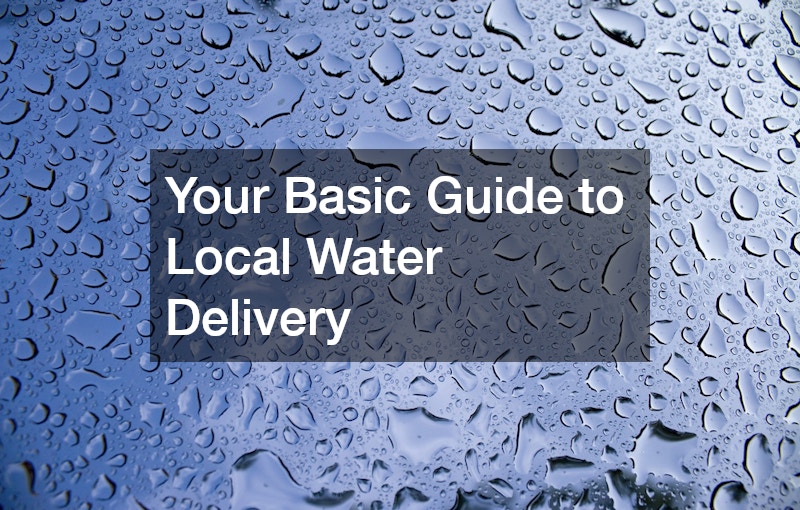Access to clean, safe drinking water is essential for both households and businesses, and local water delivery services play a crucial role in ensuring a reliable supply. By sourcing water from nearby reservoirs, lakes, or aquifers, these services offer a sustainable and efficient solution tailored to the needs of their communities. With the integration of modern technology, transparent pricing, and environmentally conscious practices, local water deliveries have become a cost-effective and convenient alternative to traditional water sources. As cities continue to grow and environmental concerns rise, the demand for localized water solutions is more important than ever.
What is Local Water Delivery?
Local water delivery refers to the service of supplying water directly to homes, businesses, or public facilities within a community. Often facilitated by local companies, this service aims to ensure that residents have a reliable supply of clean drinking water. In our rapidly urbanizing world, such services are becoming increasingly vital as they adapt to the specific needs of their communities.
The operation of local water delivery involves several key processes, including sourcing, treatment, and distribution. Water is initially sourced from nearby lakes, reservoirs, or underground aquifers, which makes the process more sustainable and community-centric. The water goes through rigorous purification at treatment plants to ensure safety and quality before being delivered. By focusing on nearby resources, local water delivery services often offer faster turnaround and minimize dependence on distant water sources.
Logistics plays a crucial role in the timely and efficient functioning of local water delivery. Modern technology allows companies to streamline their operations with GPS tracking and real-time updates for consumers. By utilizing specialized delivery vehicles, these services can cater to various demands, whether it’s scheduled regular deliveries for households or urgent supplies for events or emergencies. Consequently, local water delivery represents a blend of tradition and innovation, adapting continuously to meet modern needs.
How Can Local Water Delivery Save Money?
Local water delivery can be a financially prudent choice for households and businesses. By leveraging nearby water sources, transportation costs are significantly reduced compared to sourcing from more distant locations. Additionally, many local water companies operate at a smaller scale, allowing them to offer competitive pricing structures and flexible packages. This optimization leads to substantial savings on both delivery and infrastructure expenses.
Moreover, local water delivery often comes with transparent pricing, ensuring consumers know exactly what they’re paying for. With clear communication lines and no hidden fees often associated with larger utility companies, this transparency builds trust and offers peace of mind. Additionally, discounts or subscription-based models are frequently available, enabling customers to plan their budgets more effectively and save money in the long run.
Using local water delivery also eliminates the need for significant investments in personal water treatment solutions. Many consumers consider installing their purification systems, which can be costly and require regular maintenance. By relying on local suppliers who apply stringent quality standards, individuals and businesses can avoid these initial and ongoing expenses altogether. Thus, local water delivery presents a convenient and cost-effective alternative for meeting one’s hydration needs.

Is Local Water Delivery Environmentally Friendly?
The environmental benefits of local water delivery are notable, particularly in terms of reducing carbon emissions. By sourcing water locally, the need for long-haul transportation is minimized, resulting in fewer greenhouse gases emitted from delivery vehicles. This localized approach supports efforts to combat climate change and aligns with global sustainability goals by decreasing dependency on fossil fuels.
Local water delivery services often engage in active groundwater management and conservation initiatives. By closely monitoring their sources, these companies can ensure sustainable extraction that does not deplete local aquifers or disrupt ecosystems. Additionally, investments in advanced filtration technology and waste reduction measures further emphasize their commitment to environmental stewardship. Such conscientious practices make local water delivery a commendable choice for eco-conscious consumers.
Furthermore, the use of reusable or biodegradable packaging by some local water services reduces plastic waste commonly associated with bottled water purchases. Companies may employ recyclable containers, diminishing their environmental footprint by committing to minimal waste generation. This reduction in single-use plastics not only benefits the environment but also aligns with increasing consumer demand for sustainable options. Consequently, local water delivery encourages greener consumer habits and supports an overall healthier planet.
What Are the Health Benefits of Local Water Delivery?
Local water delivery prioritizes water quality and safety by adhering to stringent purification standards before it reaches consumers. Often subject to rigorous testing and compliance with local regulations, these processes ensure that the provided water is free of harmful contaminants. This meticulous approach helps mitigate health risks associated with impurities, offering families peace of mind about their everyday hydration.
One notable aspect of local water services is their ability to respond swiftly to any health advisories or contamination issues. With direct control over their supply chain, they can implement necessary changes quickly, ensuring continuous safe water delivery. In contrast, larger water entities with complex logistics may experience delays in adapting to such challenges. This responsiveness further enhances the attractiveness of local water delivery as a reliable and proactive solution for safe drinking water.
Furthermore, by opting for local water delivery, consumers can avoid potential downsides associated with bottled water, such as exposure to plasticizers or false security about its origin. Knowing that their water is being sourced responsibly and treated properly fosters consumer confidence. The resulting higher trust levels translate into wider acceptance and adherence to recommended water consumption guidelines, promoting overall community health and well-being.
Local water delivery provides a practical, economical, and environmentally friendly approach to meeting daily hydration needs. By minimizing transportation costs, reducing plastic waste, and ensuring strict water quality standards, these services offer a reliable alternative to large-scale water utilities. Beyond affordability and convenience, they also support sustainability efforts and foster healthier communities. As more consumers recognize the advantages of local water delivery, its role in shaping the future of water access and conservation will only continue to expand.


